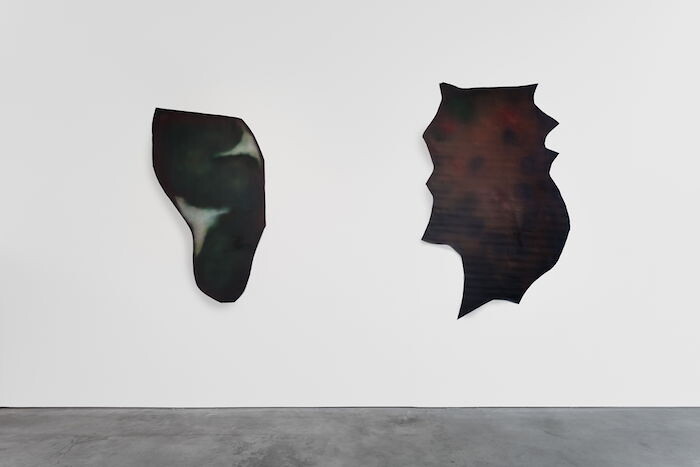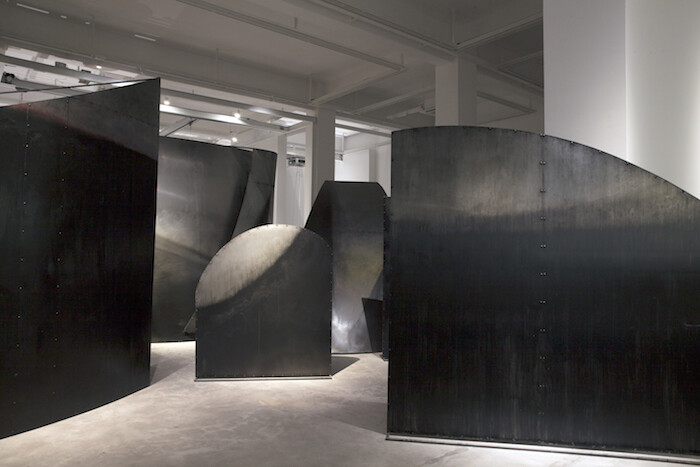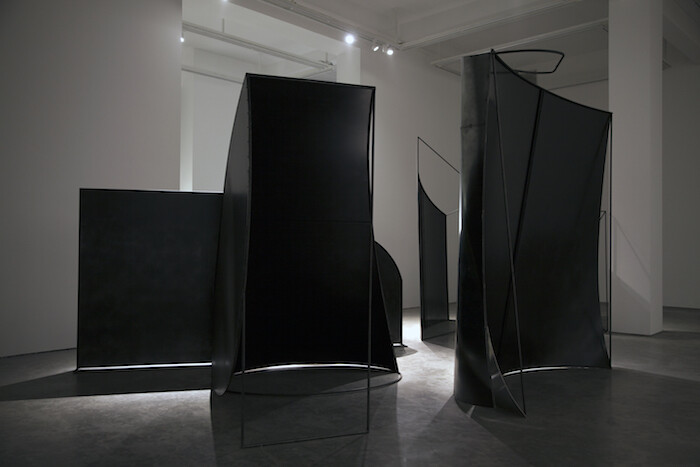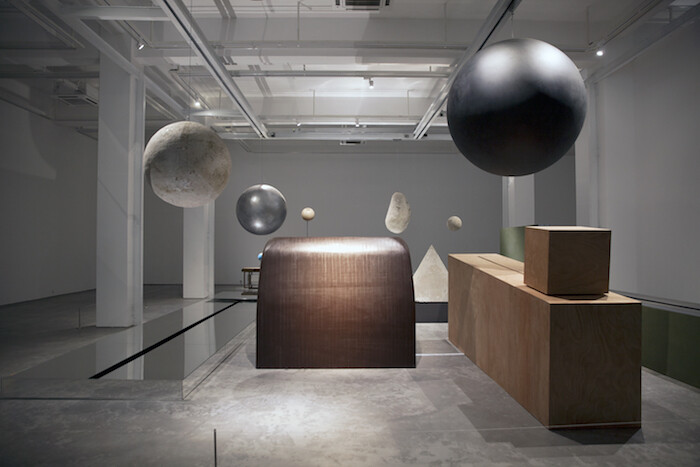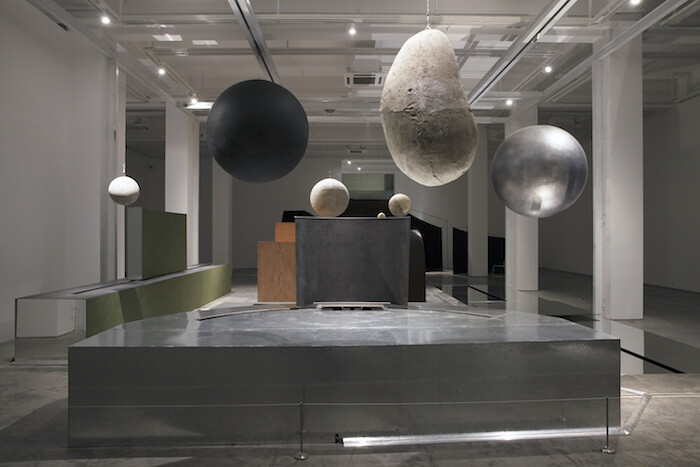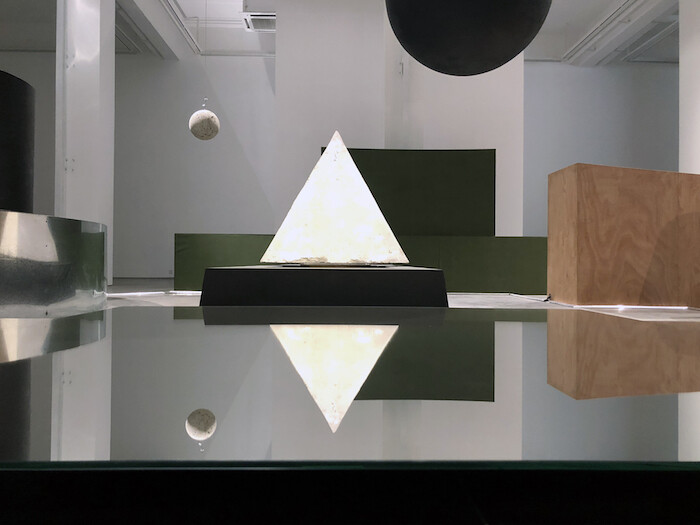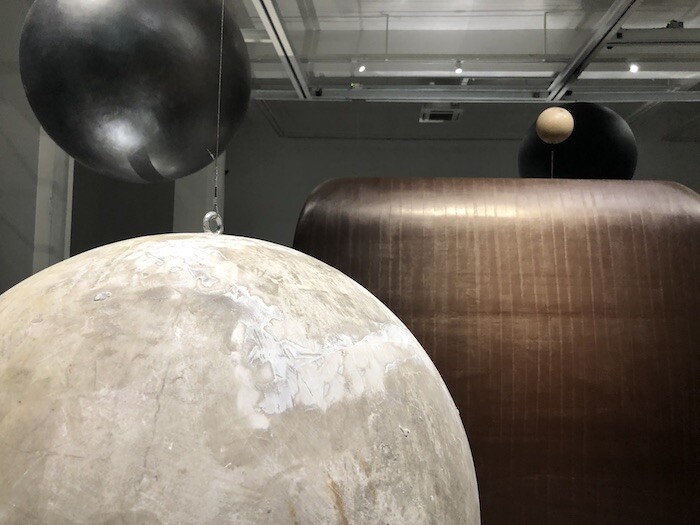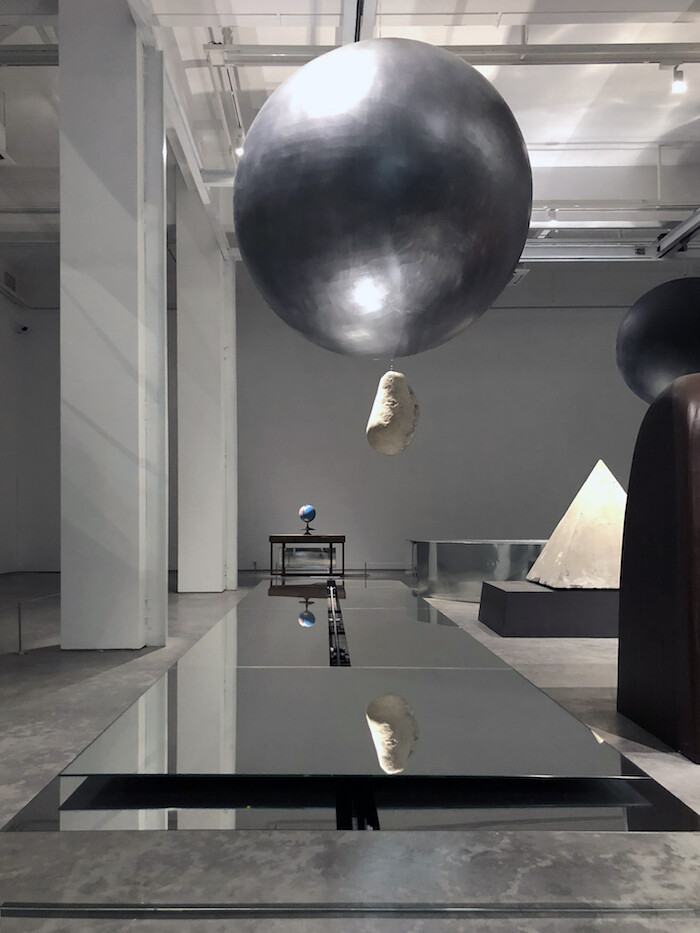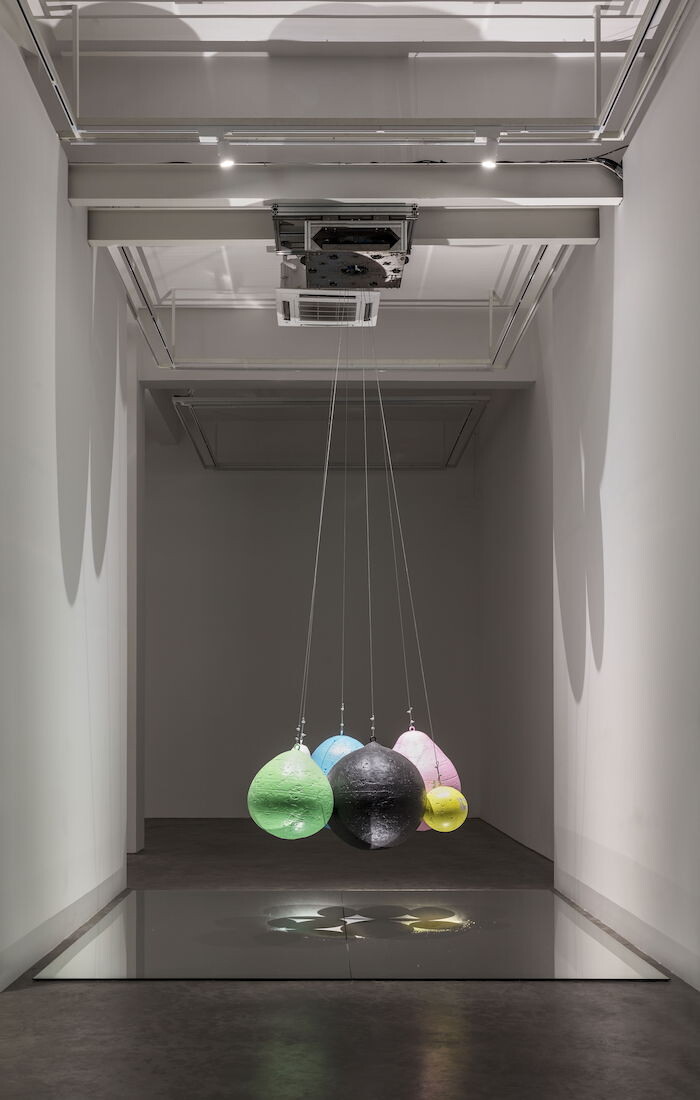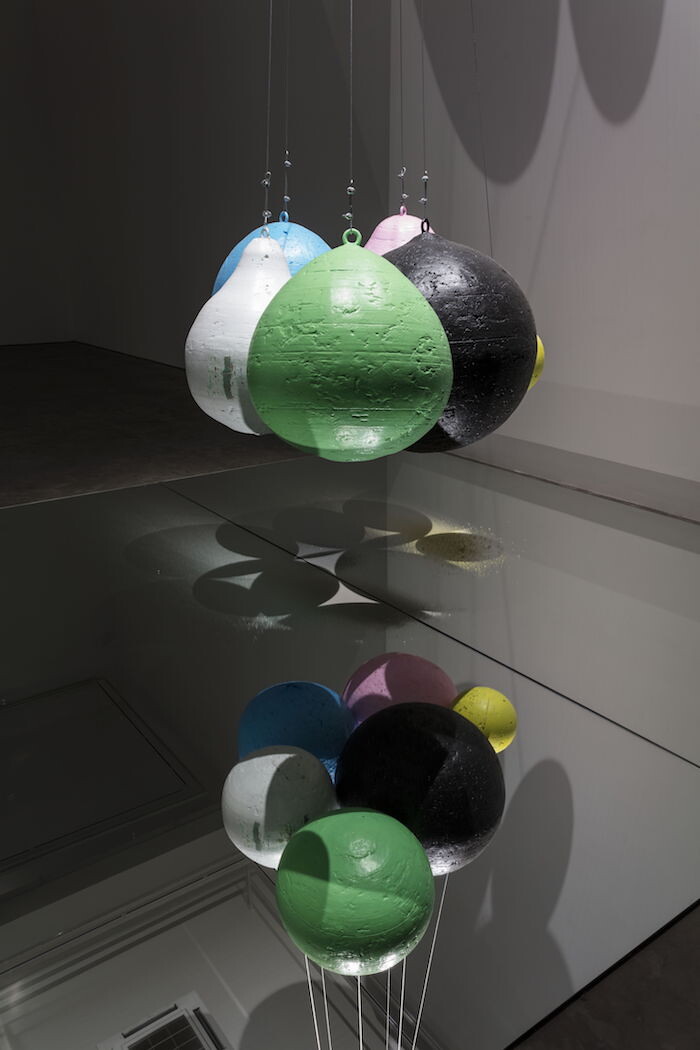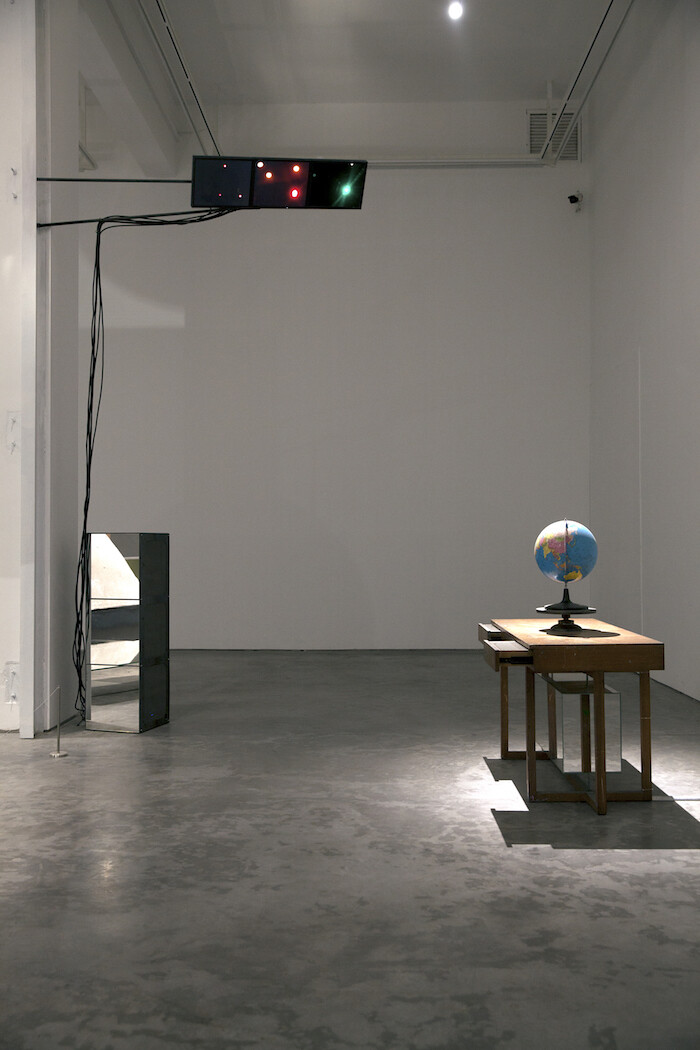Liu Wei’s “Shadows” is a rigorous exercise in time-space travel. A series of heavily pigmented, depthless shapes hang on the walls of the gallery’s foyer (“Caves,” 2018) serving as oblique entry points into the main exhibition space, where the viewer encounters a cluster of studded and welded metallic structures (Shadows, 2018). Rough edges and hollowed interiors are undergirded by steel supports, revealing these industrial constructs’ two-dimensional, prop-like nature, and giving the impression that one is entering the show from backstage. Emerging on the other side of the installation, it becomes apparent that this is indeed an elaborate set.
Liu employs a method akin to archeology, mining the fragmentary landscapes of Beijing for the collateral, the surplus, and using those found materials for his works. But if an archeologist’s job is to reconstruct the past from extant remains, Liu is instead committed to depicting an ever-evolving, shifting present as ahistorical and perpetually in flux. His endless reconfiguration of materials results in non-narrative tableaus that point to temporal and ideological dissonances rather than attempt any historical continuity.
Working in a variety of mediums, including video, sculpture, painting, installation, and performance, Liu’s practice is notable for lacking any consistent aesthetic, and his projects are unified by an ethos of upending and adaptation, tactics required to keep up with the constant agitation of his immediate environment. This exhibition marks a point of departure from the artist’s previous abstractions and fragmentary forms. Period (2018) is a procession of geometric, weighty objects, including round, planet-like spheres hung from the ceiling that crisscross the main gallery space in a methodic and carefully planned choreography. The sculptures move along calibrated tracks, suspended over wooden sculptures and a reflecting surface, bringing an unidentified constellation into orbit.
Though the difference in their speeds is barely perceptible, it is the measured kinetic movement of the objects that bares the essence of this work. Disorientation, philosopher Yuk Hui writes, is “not merely losing one’s way, but the incompatibility of temporalities, histories and metaphysics,” and in noting this calls for a reconsideration of Eastern ontologies that have been largely absent in discussions concerning modernity in China.1 The roughly hewn planets of Liu’s alter-universe—composed of industrial materials including concrete and metal at varying degrees of finish—traverse the gallery at incremental speeds, weights, and tensions, resulting in a subtle but palpable state of disorientation. In the far corner, the video Friendship (2018), shown across three monitors, features what initially appear to be stars twinkling in a night sky, but are in fact the headlights of distant, oncoming traffic at night. The implication of this mechanical mobile and artificial nocturnal scene seems to be that we review those epistemologies informing our visions of the future and begin to deconstruct them. Rather than laying any sort of Luddite claims to abandon or stage resistances to the destruction and displacement resulting from our manufactured landscapes, Liu’s work seems instead a call to examine more closely the structures on which these changes have been predicated, and which may in turn generate the possibility for other narratives.
Beginning in November last year—allegedly as a preventative measure in response to a fire in an apartment building in a south-Beijing suburb earlier that month that killed 19 workers—the city’s central government evicted tens of thousands of migrants in a weeks-long campaign to demolish unauthorized homes. The targeted areas included warehouses, rental compounds, wholesale markets, and other makeshift establishments along the rural-urban fringes of the city—an unofficial effort to purge Beijing of its so-called “low-end population.” Expulsion, sociologist Saskia Sassen explains, is not a localized process.2 To view the mass movement of people against their will within the limited narrative afforded by terms such as “migrant worker” or “refugee” is to miss the holistic point that the flow of human bodies is inextricably linked to wider structures affecting change on a planetary scale, which determine and reify the unequal distribution of resources. Liu’s work can be seen as an attempt to momentarily grasp such abstractions. In “Shadows,” nothingness draws objects, people, places, and non-places into a makeshift constellation where everything coalesces onto a plane of equivalence, ushering in new beginnings. Responding to local conditions that are often severely simplified in both media and rhetoric, Liu traces a cartography that extends beyond the visible and material, gesturing toward an ominous totality.
Yuk Hui, The Question Concerning Technology in China: An Essay in Cosmotechnics (Falmouth: Urbanomic, 2016).
Saskia Sassen, Expulsions: Brutality and Complexity in the Global Economy (Cambridge: Harvard University Press, 2014).
